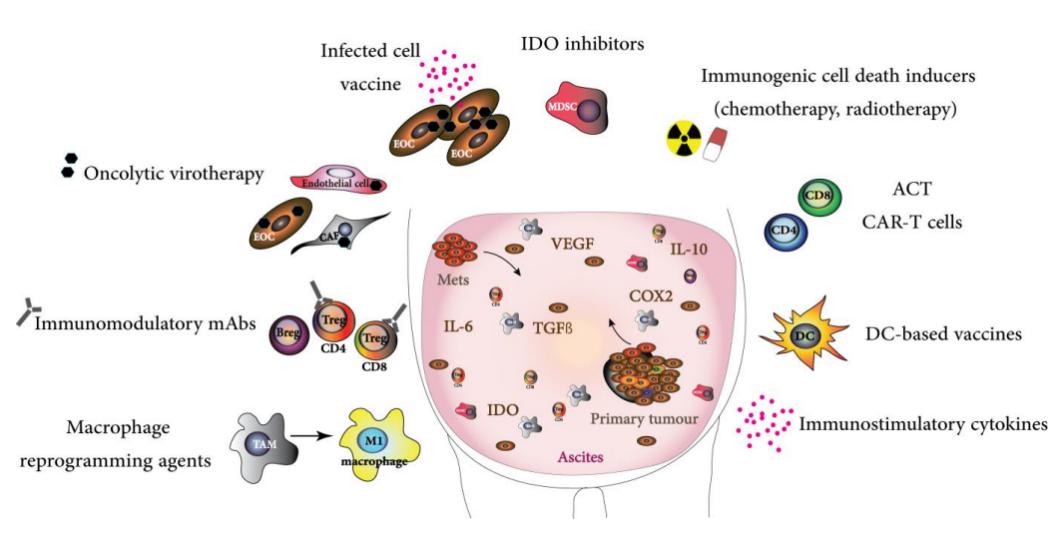Engineering Ovarian Cancer Cell SK-OV-3 for Self-destruction
Equipped with state-of-the-art facilities, Creative Biolabs is dedicated to bringing together years of valuable experience to help our clients shorten the clinical study journey. We are committed to providing engineering ovarian cancer cells SK-OV-3 for self-destruction purposes to reduce the overall project development timeline for our clients.
Immunotherapies Targeting Ovarian Cancer
Ovarian cancer is one of the main causes of higher mortality among women. Although there have been several innovations in the treatment of ovarian cancer over the past few decades, the survival rate for ovarian cancer is still not satisfactory. At present, using autologous tumor cells as viral vectors to enter the tumor niche is a promising new strategy for ovarian cancer immunotherapy. Through the use of tumor cells as the viral carrier, TME can be remodeled making "cold" tumors into "hot" tumors, to support and sustain significant anti-tumor responses. This approach may benefit OCs patients with poor tumor immune infiltration and non-response to standard therapies. Further studies are needed to assess the conditions (TME quality, tumor grade, etc.) that benefit patients with EOC from this approach, as well as to determine whether this rationale can be used for tumor cells derived from EOC ascites.
 Fig.1 Emerging ovarian cancer immunotherapies. (McCloskey, et al., 2018)
Fig.1 Emerging ovarian cancer immunotherapies. (McCloskey, et al., 2018)
Engineering Ovarian Cancer Cells SK-OV-3 for Self-destruction
Creative Biolabs has robustly developed several novel synthetic gene circuits engineering platforms for cancer Immunotherapy to support clients' project development. We are committed to providing engineering ovarian cancer cell line SK-OV-3 for self-destruction purposes. SK-OV-3 is a highly metastatic, drug-resistant human ovarian carcinoma cell line, which expresses multiple antigens used to identify cancers of epithelial origin in clinical practice, such as VIM (vimentin), HMWK (high molecular weight cytokeratin), LMWK (low molecular weight cytokeratin), EMA (epithelial membrane antigen) and LCA (leucocyte common antigen). And the cell line is widely used as an ideal model to study the mechanism of ovarian cancer. With profound expertise and state-of-the-art technology platforms, we are dedicated to designing comprehensive research practices and handling high-quality service for our clients all over the world. In addition, we are glad to provide tailored services to each project to ensure that the objectives are met or exceeded.
Features of Our Services
-
Extensive experience in synthetic gene circuits engineering platforms
-
Advanced techniques and custom assay service
-
Excellent quality and timely feedback
Moreover, Creative Biolabs provides the following cancer research topic services for our clients, including but not limited to:
For further details, please don't hesitate to contact us to discuss your project.
References
-
Luo, X.; et al. Shaping immune responses in the tumor microenvironment of ovarian cancer. Frontiers in Immunology. 2021, 12:2383.
-
McCloskey, C.W.; et al. Ovarian cancer immunotherapy: preclinical models and emerging therapeutics. Cancers. 2018, 10(8):244.
For Research Use Only | Not For Clinical Use


 Fig.1 Emerging ovarian cancer immunotherapies. (McCloskey, et al., 2018)
Fig.1 Emerging ovarian cancer immunotherapies. (McCloskey, et al., 2018)
 Download our brochure
Download our brochure